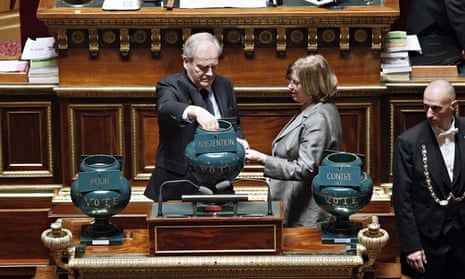The French and Irish parliaments have become the latest in Europe to call on their governments to recognise an independent state of Palestine, confirming a trend, alarming for Israel, that reflects changing public opinion across the continent.
In Paris on Thursday the senate ratified an earlier decision by the national assembly, while MPs in Denmark were holding the first reading of a motion urging the government to recognise Palestine as a state alongside Israel within its 1967 borders.
Wednesday’s vote by Irish MPs drew criticism from Israel, which argues that recognition prejudices the outcome of peace negotiations. The Israeli foreign ministry accused the Irish parliament of giving voice to “statements of hatred and antisemitism directed at Israel in a way which we have not heard before”.
In October Israel withdrew its ambassador from Stockholm when Sweden became the first western EU member state to recognise Palestinian statehood. Eastern European EU members recognised it years before they joined in 2004.
Subsequent non-binding parliamentary votes in Britain, France and Spain – the first two being permanent members of the UN security council – calling on their governments to follow Sweden have not meant instant diplomatic change, but the decisions are symbolic and are thought likely to influence policy eventually.
The latest votes came against a background of high tension on the ground in the West Bank as thousands of Palestinians gathered on Thursday to mourn a senior official who died in a confrontation with Israeli troops on Wednesday.
In Britain David Cameron appears to have shifted in favour of Israel by echoing its argument that negotiations must precede recognition, to the private annoyance of some Foreign Office diplomats.
Poor prospects for the resumption of meaningful peace talks aiming at a two-state solution between Israel and the PLO mean pressure is likely to mount, though new Israeli elections in March may give pause for thought. The recent war in Gaza, in which 2,000 Palestinians and dozens of Israelis were killed, is another factor behind this growing trend. The nature and intensity of criticism of Israel in Britain in particular showed a marked change.
Federica Mogherini, the Italian EU foreign policy chief, has said she would like to see a Palestinian state come into existence within her five-year term.
The EU has implemented tougher policies towards Israel by ensuring that goods originating in illegal settlements in the occupied West Bank do not benefit from preferential tariffs granted to Israel. But it does not have the power to recognise Palestine collectively as diplomatic relations are a matter for individual member states.
Germany, with its historical sensitivities because of the Holocaust, may be the last to take the plunge. The European parliament will discuss the issue next week.
These votes represent gains for the PLO. In 2011 Palestinian president Mahmoud Abbas failed to secure full Palestinian membership of the UN due to a US veto on the security council. But the following year 135 members of the UN general assembly – a majority – gave it their support.
“For Palestinians there should be an alternative to either violent resistance or passive acquiescence to the occupation that can demonstrate that non-violent political, diplomatic and legal tools can produce results,” said Daniel Levy of the European Council on Foreign Relations.
Sir Vincent Fean, former UK consul-general in Jerusalem, said: “The groundswell of support for moderate non-violent, non-Hamas PLO is growing. In Europe and Britain there is a growing feeling that Israel is not serious in claiming to be seeking Palestinian recognition of Israel as a Jewish state after Yasser Arafat recognised Israel in the Oslo agreement in 1993.
“Every visitor who takes the time to go to the West Bank – pilgrims, Christians, atheists, Muslims, whether they are MPs or from NGOs or Church organisations – sees the [Israeli] wall, sees these settlements with 600,000-plus inhabitants, the checkpoints, which are a daily humiliation, and the difficulties students face in getting there from Gaza.”
Levy added: “While this parliamentary resolution or even actual French recognition of Palestine is largely symbolic, recognition has become the next step on a journey towards creating tangible consequences on Israel if it continues to pursue policies antithetical to peace, to Palestinian statehood, and to international law. Nothing is likely to change in Israel until its public feels that impunity for occupations and settlements is eroding.”
- The headline on this article was changed on 11 December 2014. An earlier headline incorrectly implied the French and Irish governments had recognised the state of Palestine.







